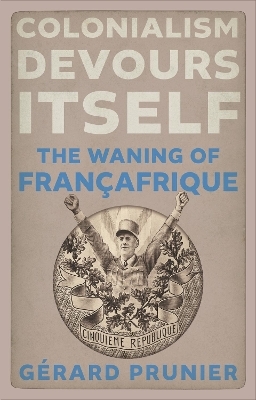
Colonialism Devours Itself
The Waning of Françafrique
Seiten
2025
C Hurst & Co Publishers Ltd (Verlag)
978-1-911723-65-3 (ISBN)
C Hurst & Co Publishers Ltd (Verlag)
978-1-911723-65-3 (ISBN)
- Noch nicht erschienen (ca. Februar 2025)
- Versandkostenfrei innerhalb Deutschlands
- Auch auf Rechnung
- Verfügbarkeit in der Filiale vor Ort prüfen
- Artikel merken
A historically grounded account, from de Gaulle onwards, of how France's neocolonial influence crumbled in Africa, with devastating and unforeseen consequences.
France is the only country that never decolonised its colonies, emotionally, financially or strategically. In the aftermath of losing the Second World War, notwithstanding de Gaulle's attempts to convince his people otherwise, the French knew the game was up. (The Resistance fighters were heroes; but heroes are lonely.) For France, after 1945, the Second World War blended into the early Cold War, which Paris jumped into the day before it began. It fought in Indochina, and lost again. The independence war dragged on in Algeria. Then France lost there, too--painfully, with millions of its ordinary citizens expelled to a homeland that many of them hardly knew.
But Sub-Saharan Africa was still there. France produced a postcolonial antidote: 'Françafrique', France's sphere of influence (or 'backyard') over its former West and Central African colonies. France loved Africa. Some Frenchmen died for 'Françafrique'; others made millions from it.
The entire toxic edifice is now crumbling away. Young Africans are happy about this--but not so many of their parents, who often live in France. In his inimitable style, Gérard Prunier recounts a tragic transcultural saga, with one leg in the past and one in the future: the end of 'Françafrique'.
France is the only country that never decolonised its colonies, emotionally, financially or strategically. In the aftermath of losing the Second World War, notwithstanding de Gaulle's attempts to convince his people otherwise, the French knew the game was up. (The Resistance fighters were heroes; but heroes are lonely.) For France, after 1945, the Second World War blended into the early Cold War, which Paris jumped into the day before it began. It fought in Indochina, and lost again. The independence war dragged on in Algeria. Then France lost there, too--painfully, with millions of its ordinary citizens expelled to a homeland that many of them hardly knew.
But Sub-Saharan Africa was still there. France produced a postcolonial antidote: 'Françafrique', France's sphere of influence (or 'backyard') over its former West and Central African colonies. France loved Africa. Some Frenchmen died for 'Françafrique'; others made millions from it.
The entire toxic edifice is now crumbling away. Young Africans are happy about this--but not so many of their parents, who often live in France. In his inimitable style, Gérard Prunier recounts a tragic transcultural saga, with one leg in the past and one in the future: the end of 'Françafrique'.
Gérard Prunier is a renowned historian of contemporary Africa, author of, 'inter alia', the acclaimed 'The Rwanda Crisis: History of a Genocide' and of 'The Country that Does Not Exist: A History of Somaliland', both published by Hurst.
| Erscheint lt. Verlag | 27.2.2025 |
|---|---|
| Verlagsort | London |
| Sprache | englisch |
| Maße | 126 x 190 mm |
| Themenwelt | Geschichte ► Teilgebiete der Geschichte ► Wirtschaftsgeschichte |
| ISBN-10 | 1-911723-65-0 / 1911723650 |
| ISBN-13 | 978-1-911723-65-3 / 9781911723653 |
| Zustand | Neuware |
| Haben Sie eine Frage zum Produkt? |
Mehr entdecken
aus dem Bereich
aus dem Bereich


